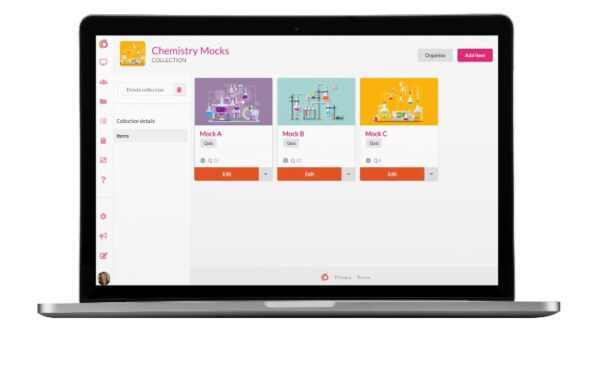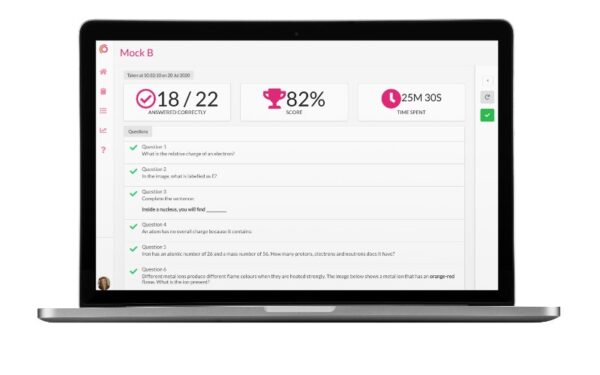As home-schooling comes to an end, parents up and down the country will no doubt be heaving a huge sigh of relief this week as homes fall silent and classrooms regain that familiar buzz and chatter.
It’s been a massive challenge for everyone – but tech has played a vital role in ensuring that many children were able to continue their education despite the restrictions caused by COVID-19.
Jenny Brookfield looks at the tech businesses that have enabled learning from home to happen – and asks whether some of the new ways of learning will hang around. No.4: Synap
Online exams were on the five-year roadmap for the education sector and professional bodies and COVID simply brought that time closer.
That’s the view of Dr James Gupta, co-founder of Leeds-based EdTech business Synap, who says it has been “pedal to the metal” to bring many exams online in the past year.
“We’ve been working with schools, companies and professional bodies to take paper-based exams and change them so they can be delivered online,” he tells BusinessCloud.
“We’ve been investing heavily in a new model of what we do designed to deliver secure exams at scale with thousands of students sitting the same exam at the same time.”


As with many of the EdTechs that have had to react swiftly to the switch to learning from home, Synap brought forward a number of features that were already on its to-do list.
Founded in 2015 by Gupta and Omair Vaiyani, who met while studying at Leeds University, Synap offers online courses, revision and live exams.
Its technology enabled 8,000 law students at the University of the Free State in Bloemfontein, South Africa, to sit their annual exam, which had to be carried out remotely due to COVID restrictions.
But it’s not just a case of transferring an exam online and allowing students to sit it. With slow internet speeds and poor connectivity a problem in South Africa, the main challenge that needed to be overcome was the prevention of cheating, which could potentially be done by copying and pasting essay answers, messaging other students and having another student sit the exam for them.
Synap’s solution had a low internet requirement, allowing students to be monitored despite slow speeds. Not only that, but the team came up with other methods to avoid cheating, such as splitting the exam into sections, randomising the question order and limiting how many questions could be skipped.
https://businesscloud.co.uk/is-lfh-here-to-stay-students-could-gain-uni-degrees-without-ever-visiting-campus/
Innovation such as this boosted took the business from working with 15 organisations pre-COVID to 40 now, and the workforce from 10 to 15 as additional developers were recruited.
“We’re adding new features all the time and we’re currently trying to accommodate a range of different exam subjects, because a maths exam has different requirements to an English exam, for example,” Gupta says.
“We’re making it easier for teachers to write material and for that material to display on any device a student might be using.”
There are other considerations, such as improving the testing and monitoring process so that if a system goes down right before 5,000 students are set to take a law exam, the issue can be fixed in minutes and not hours.
“It’s been a year of ups and downs, like it has for everyone, but we’ve been lucky in tech that we’ve seen an uptick,” Gupta says. “It’s been a challenge, but we’ve come through this as a stronger team and we were heading down this way anyway, to go into offering exams to large institutions.”
https://businesscloud.co.uk/is-lfh-here-to-stay-tassomai-founder-edtech-had-a-duty-to-step-up-during-pandemic/
While educational organisations have had to switch to online learning and testing, he believes this would have happened at some stage anyway.
“The pandemic has catalysed a few of the decisions that companies would have made down the line about online exams,” he says.
“The impression that we’re getting is that it’s not going to go straight back afterwards, with a lot of companies investing in training and infrastructure to deliver exams online.
https://businesscloud.co.uk/is-lfh-here-to-stay-meet-edtech-tapestry-an-emergency-service-during-covid-19/
“There are some things that work better in person, and things that work better online, and I think the future will be a balance of both.
“Lectures, for example, aren’t a particularly interactive form of learning and could quite easily be recorded to free up a professor’s time for learning with workshops and small group sessions in person.”
CoronavirusCOVID-19

